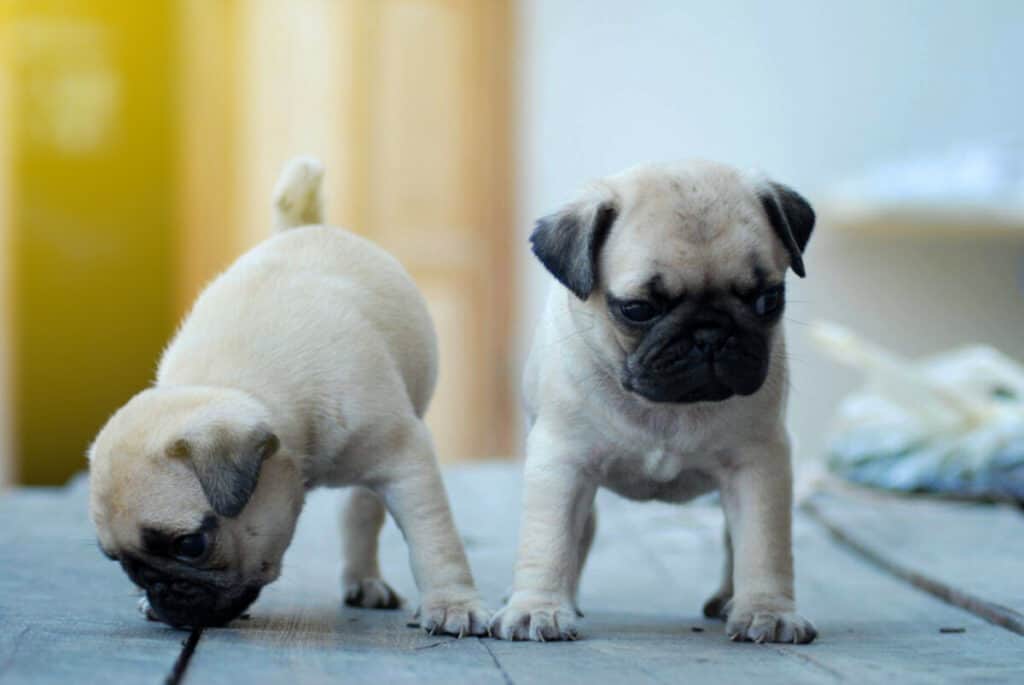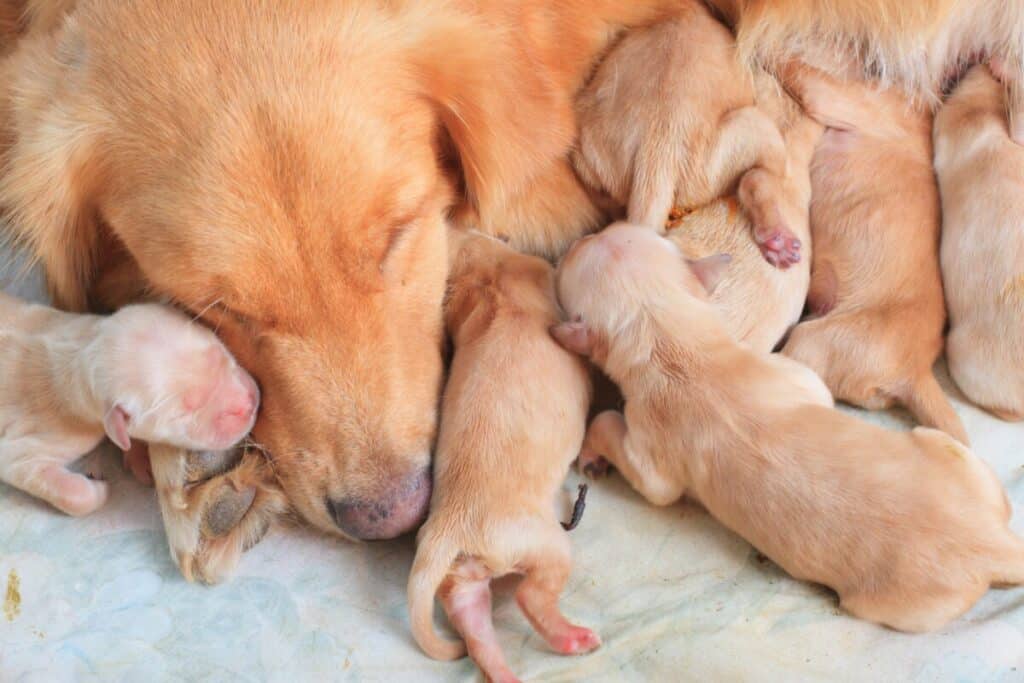
Puppies, just like babies, need someone who can monitor their health as they grow. Proper bowel movements are needed in maintaining health and can indicate how healthy puppies are. So, how often do newborn puppies poop?
Newborn puppies poop 5-6 times per day, generally after every feeding. This is because their digestive system is still developing, so food moves through their system faster than older dogs.
Taking care of poop is one of the less glamorous aspects of owning a dog. Being prepared for anything when it comes to maintaining bowel health in puppies will help keep them healthy and happy as they grow and develop.
How Often Do Newborn Puppies Poop?
Newborn puppies poop an average 5-6 times per day after they are fed (generally every 2-3 hours), and some may poop more than 6 times per day. When puppies are born, their bodies are still developing.
In puppies, their intestinal tract is still developing. This means that food is moving through their system quicker than older dogs, and that food may not be fully digested when it's released. They won't reach normal pooping habits for dogs until they are about 1 year old.
Knowing how frequently puppies should poop as they grow beyond the newborn stage indicates progressing health. The chart below shows what you should expect at certain developmental marks over the first year of your puppy's life.
How Often Puppies Should Poop On Average During Their First Year
| Puppy Age | Number of Times they Poop Daily |
| Newborn | 5-6 times per day |
| 12 weeks | 4 times per day |
| 6 months | 3 times per day |
| 1 year | 1-3 times per day |
Through observing the growth of your puppy, you will be able to tell what a normal, healthy pooping schedule is for them. If a newborn puppy's poop suddenly rises or drops in frequency, if they stop pooping, or if they seem to need help pooping, it may be time to look into medical help.
When Should a Newborn Puppy Poop?
Puppies will take time to understand their bodily needs and signals. Generally, puppies will need to poop after they eat. Keeping a close eye on their feeding schedule will not only help you to be aware of when they need to poop but will also provide the opportunities to begin potty training them.
Once a puppy has finished feeding, it doesn't need to go outside immediately. You can wait a few minutes while their food digests before taking them outside, where you can wait for them to relieve themselves.
As puppies get to about 4 weeks of age, monitoring their feeding and pooping will become easier because this is when solid food will be introduced into their diet. They will be fed about 4 times per day, meaning that they should be taken outside to poop at least 4 times per day.
Keep in mind that up through 12 weeks of age, they may still be pooping about 5 or 6 times a day. After that, they will start pooping less often.
Knowing when a puppy should poop is also indicated by their body language. If they are walking in circles and sniffing the floor, or positioning themselves to poop, this indicates that they need to go. Moving them outside quickly once you notice this body language is another way to potty train them as they grow.
How Long Can Puppies Go Without Pooping?

Because puppies need to poop several times a day after feeding, there may be signs that they are not pooping enough. Additionally, puppy parents may need to consider this question if they plan on traveling with a puppy in tow.
For adult dogs, constipation becomes concerning after 48-72 hours. For puppies, because they poop much more frequently, it may be obvious that their schedule is off within 24-48 hours. A newborn puppy that poops only 4 times a day may still be healthy. However, if they are pooping less than this, it's likely time to consider calling the vet.
One reason puppies may not be pooping enough is because of an intestinal blockage. They may have eaten something that is keeping them from pooping, and it needs to be removed quickly.
Sick puppies also poop less than healthy puppies. Once they feel better and are able to be active and feed on their normal schedule, they should be back to a normal poop schedule.
When traveling with a puppy, parents should plan to make enough frequent stops to serve their puppy's normal pooping schedule.
As a side note, training puppies to poop on surfaces other than grass will help them adjust to pooping in different places while traveling. If puppies are only trained to poop on grass, they may not recognize the opportunity to go while on the road, simply because it is not instinctive for them to poop outside.
What Happens If a Newborn Puppy Doesn't Poop?

If your newborn puppy isn't pooping, you should be concerned; also, there are a few things you can try before taking them to the vet.
Rubbing their bellies in a circular motion encourages bowel movements. Because their digestive tracts are still developing, sometimes it will take a little coaxing from an extra hand to move food through their system.
If your puppy is used to pooping in a certain spot, take them there. Puppies can be territorial when it comes to pooping and may have grown accustomed to only using a certain spot in the yard, especially when they are potty training.
Foods high in fiber are helpful for bowel movements. Plain pumpkin is healthy for dogs and is high in fiber. If a puppy isn't pooping, try feeding it high-fiber food (they must be old enough to chew and process those foods), and then taking on a walk later.
Squirting cold water on its bottom is another can also help a puppy poop. It will cause their anus to contract, which may help poop to move through their system.
If a puppy is healthy, it likely won't deal with constipation. If these or other home remedies don't work, talk to a vet so your puppy can get any necessary care and get back to their normal health.

Cindy is a prolific writer and online researcher who can't imagine life without dogs. There is scarcely a dog topic she has not researched or written about. Her love for dogs and helping dog parents is evident by the thousands of dogtemperament.com visitors who read her articles monthly. Most of all, each topic Cindy writes on helps forge a stronger bond and understanding between her and her happy Catahoula Leopard Dog Jossie.